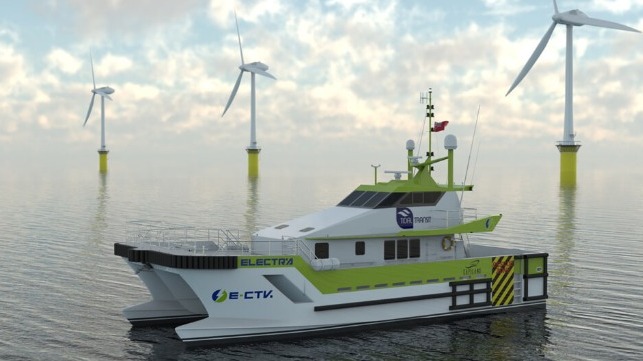UK Retrofit Project to Create World's First Electric Fully-Battery CTV

A demonstration project is planned for the UK that will see a crew transfer vessel (CTV) built in Spain in 2011 become the world’s first retrofitted Electric Crew Transfer Vessel (E-CTV). The project which was selected by the UK as a leading-edge project in decarbonization calls for the creation of a vessel that will operate entirely on electric power replacing the existing combustion engines with a 100 percent emissions-free solution.
The vessel selected for the project was built by Spain’s Mercurio group. Currently known as the Ginny Louise, she is a 65-foot (20-meter) vessel designed to carry up to 12 people offshore to the work site. She has speeds of up to 25 knots.
“We are delighted to be involved with such a landmark project, which will feature our first ever Volvo Penta IPS powered 100 percent by batteries and with no on-board diesel generators. It’s an ultra-efficient set-up that will deliver longer-range and emissions-free transfers. There’s also closer control and maneuverability so journeys are safer, faster, and more reliable,” said Mehmet Belibagli, Sales Manager, Marine Commercial at Volvo Penta UK.
The old propulsion system will be replaced with a Quad Installation of Volvo Penta IPS 30 paired with fully electric motors and over 2 MW of onboard battery capacity. The retrofit will outfit the vessel will forward-facing, individually-steerable drives with twin counter-rotating propellers. They report the unique design will deliver better maneuverability and a smoother ride.
For the captain and vessel operators, there will be changes to the helm station. These will include the installation of Volvo Penta’s Joystick Control, for fingertip movements, assisted docking, for stress-free positioning, and the Glass Cockpit System for a smoother driving experience.
Tidal Transit which owns and operates the CTV reports that a new charging infrastructure will be installed, both through an onshore charging station and an offshore wind turbine-based charger. This will greatly increase the range of the vessel and the amount of time it can spend at work.
The cost of the retrofit is estimated at £8 million ($10 million) with £6.3 million ($7.9 million) coming from the Zero Emissions Vessel and Infrastructure (ZEVI) program sponsored by the UK government. The program is part of the Department of Transport and Innovate UK innovation agency's effort to develop, deploy, and operate clean maritime solutions. Goodchild Marine Services, Artemis Technologies, and MJR Power & Automation are all involved in the project with Tidal Transit. Key equipment suppliers include Volvo Penta, Danfoss, and Corvus Energy.
Once complete, the vessel will be renamed e-Ginny. It will support crew transfers at an offshore UK wind farm for three years. The project started at the beginning of 2024 and is expected to run for 15 months.
